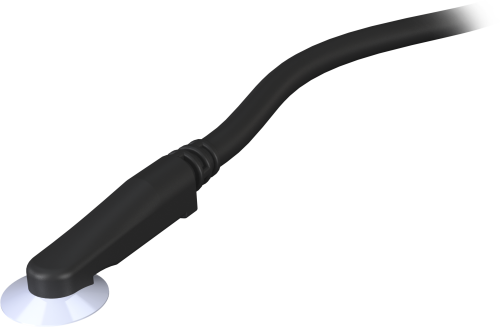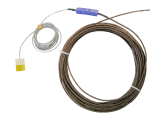This product has limited availability. It will be replaced by: CS241. Some accessories, replacement parts, or services may still be available when it is no longer available.

Class A accuracy at any cable length






Overview
The CS240 is a surface mountable PRT that measures back-of-module temperature for solar energy applications. It uses a precision Pt-1000 class A PRT to provide the highest level of accuracy. To withstand the harsh treatment commonly seen in MET station installation, the PRT is safely housed inside a specially designed self-adhesive aluminum disk.
Read MoreBenefits and Features
- Precision Pt-1000 Class A sensing element
- Compliant with IEC 60751, DIN EN 60751 (according to IEC 751)
- Various cable lengths available
- Rugged design holds up in harsh conditions and conduit installations
- Self-adhesive backing for easy mounting that lasts decades
- 2-wire and 4-wire configuration to satisfy data logger channel count and accuracy—even at long cable lengths
- Quick sensor head connection for easier installation and replacement
- NIST traceability provided with purchase of optional 3-point temperature calibration
Technical Description
The CS240 consists of a Pt-1000 class A PRT encased in an aluminum disk. The disk protects the PRT, particularly during installation when pulled through conduit, and promotes heat transfer from the surface. An adhesive tab on the disk fastens the CS240 to the measurement surface. If the temperature may exceed 70°C, Extreme sealing tape is also required to secure the probe.
The CS240 provides PV stakeholders with highly accurate back-of-module temperature, even at long cable lengths, for use in power performance modeling and simulation of solar energy applications. Back-of-module temperature is critical for any evaluation of effective irradiance and power conversion.
Images










Specifications
| Sensor | 1000 Ω DIN Class A RTD |
| Measurement Description | Back-of-module temperature |
| Operating Temperature Range | -40° to +135°C |
| Cable Temperature Rating | 105°C |
| Class A PRT Accuracy | ± (0.15 + 0.002T) |
| Temperature Coefficient | TCR = 3850 ppm/K |
| Element Type | Precision 1000 ohm Class A platinum sensing element (Pt-1000) |
| Long-Term Stability | Maximum Ro drift 0.04% (after 1000 h at 400°C) |
| Measuring Current | 0.1 to 0.3 mA |
| Disk Material | Anodized aluminum |
| Cable Jacket Material | Black semi-gloss PVC, UL VW-1 sunlight-resistant for outdoor use |
| Sensitivity | ±0.06 Ω or ±0.15°C |
| Disk Diameter | 2.54 cm (1.0 in.) |
| Overall Probe Length | 6.35 cm (2.5 in.) |
| Overmolded Joint Dimensions | 5.72 x 1.12 x 1.47 cm (2.25 x 0.44 x 0.58 in.) |
| Weight | 90.7 g with 3.2 m cable (0.2 lb with 10.5 ft cable) |
Conductors |
|
| Wire Size and Type | 24 AWG (7/32) tinned copper |
| Insulation Type | PVC |
| UL | AWM 10012 1000V 105°C |
| Filler | Fibrillated polypropylene as required for uniform round construction |
| Drain | 24 AWG (7/32) tinned copper (cabled, touching foil) |
| Shield | Aluminum/Mylar (100% coverage, 25% minimum overlap, foil facing in) |
| Nominal Wire Diameter | 0.61 mm (0.024 in.) |
Compliance |
|
| -NOTE- | Compliance information can be found in the Documents section of the web page. |
| Approvals | UL AWM 2586 1000V 105°C; CSA AWM 600V 105°C FT |
| EMC Compliance | Conforms with Electromagnetic Compatibility Directive (EMC). |
| RoHS2 | Conforms with the Restriction of Hazardous Substances Directive (RoHS2). |
Resources and Links
Product Brochures
Compliance
Videos & Tutorials
Listed Under
FAQs for
Number of FAQs related to CS240: 3
Expand AllCollapse All
-
Even when three-pt calibration isn’t ordered, when we build the probes, we perform a final test to verify that they are reading within 0.3°C of our calibrated reference sensor at room temperature.
-
A hot spot is caused if a cell in series is under-producing due to shading and gets reversed bias due to the other producing cells. For bifacial modules, as long as the front face is not shaded, all the cells should be producing and covering a small area on the back side and should not cause a severe mismatch.
-
NIST traceability provides an assurance of accuracy. This is especially desirable in accordance with IEC 61724, which is a specification for monitoring solar energy generation that requires calibrated sensors.
Articles and Press Releases
Newsletter Articles
Privacy Policy Update
We've updated our privacy policy. Learn More
Cookie Consent
Update your cookie preferences. Update Cookie Preferences


